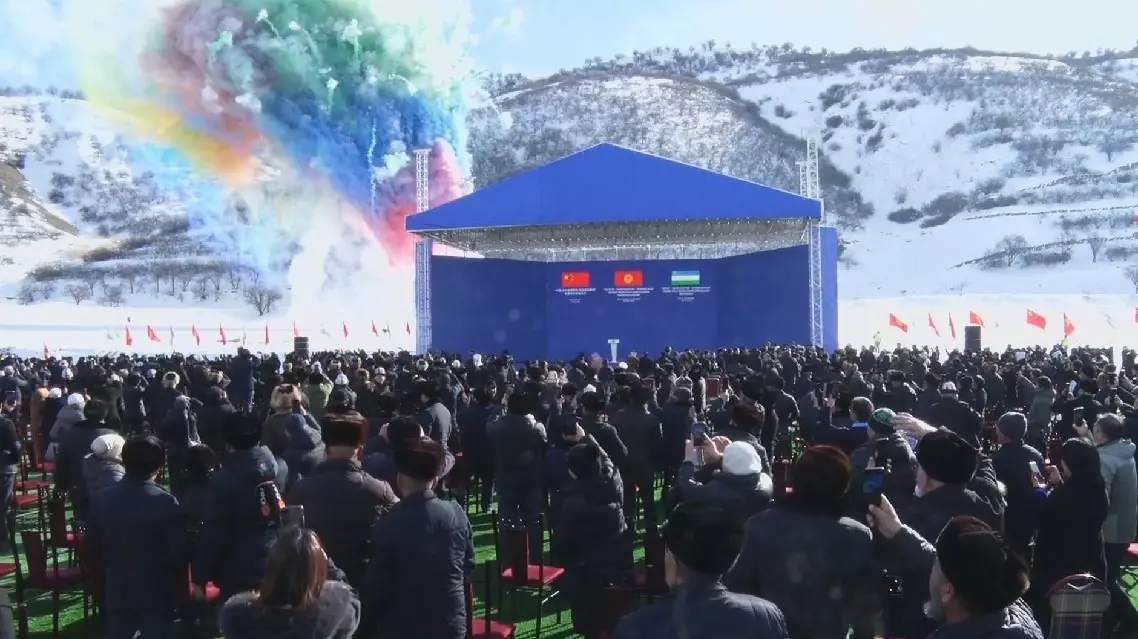China has built 52 fully automated terminals, with the application scale, operating efficiency and technical level ranking among the top in the world, said Vice Minister of Transport Li Yang in Beijing on Friday.
Speaking at a press conference, Li said that China's Shanghai Port became the first port in the world to achieve an annual container throughput exceeding 50 million twenty-foot equivalent units (TEUs) on Dec. 22, a breakthrough signifying that China's port development has reached a new height.
"The operation efficiency, service level and service capacity of China's ports are world-class. I would like to take the port operation efficiency as an example. In China, the average in-port period of an international cargo ship is 1.42 days, and the berth period of an international cargo ship is 0.87 days. From January to November this year, the ports in China completed a cargo throughput of 16.04 billion tons, with the throughput in the entire year expected to reach 17.5 billion tons, a year-on-year increase of 3.4 percent. In the first 11 months, China's container throughput reached 300 million TEUs, a year-on-year increase of 7.3 percent," he said.
China has been investing in and constructing a number of major port projects, including the largest commercial vehicle roll-on and roll-off terminal on the Yangtze River, built in the Taicang Port in Suzhou City of east China's Jiangsu Province, as well as inland port terminals in Chongqing and Anhui, according to Li.
"So far this year, China's investment in port construction has remained high. From January to November, the investment in ports reached 122.3 billion yuan (about 16.76 billion U.S. dollars), a year-on-year increase of 6.9 percent. The function of ports as hubs linking land and water transport has been further strengthened. China's maritime connectivity has always maintained a global lead, thanks to the improvement of port service capabilities and port network set-up in the country. Besides, China has been accelerating the development of port rail-water transport. From January to November, the volume of intermodal rail-water freight reached 10.63 million TEUs, a year-on-year increase of about 15 percent," said Li. "China has been accelerating green and smart transformation of the ports across the country. The clean energy utilization rate of trucks that transport containers in China's 11 international hub seaports has exceeded 60 percent, and the green transportation rate of bulk cargo such as coal and ore in major coastal ports has exceeded 85 percent, which has played a significant role in purifying the air of ports and surrounding cities. China has built 52 fully automated terminals, with the application scale, operating efficiency and technical level ranking among the top in the world," he said.

China boasts 52 world-class fully automated terminals: vice minister
The commencement ceremony of the China-Kyrgyzstan-Uzbekistan railway project was held in Jalalabad, Kyrgyzstan on Friday, and Chinese President Xi Jinping sent a congratulatory letter to the commencement ceremony of the cross-border railway project.
In his letter, Xi emphasized that the construction of the China-Kyrgyzstan-Uzbekistan railway is a strategic decision made by the governments of the three countries to enhance regional connectivity, prosperity, and stability.
He noted that the project represents a significant step forward in promoting cooperation and development across the region.
At the ceremony, representatives from the three countries unveiled the project's cornerstone.
President Xi's special envoy and director of the National Development and Reform Commission, Zheng Shanjie, attended the launch ceremony.
Zheng read out President Xi's congratulatory letter and delivered a speech at the event, emphasizing the project's significance as a milestone in trilateral cooperation.
Kyrgyz President Sadyr Japarov attended the event, stating that the railway will serve as an important strategic bridge connecting the countries of the East and the West.
Officials from the railway companies of Kyrgyzstan and Uzbekistan have also welcomed the project for its potential to enhance regional connectivity and foster development.
"Overall, the project will establish direct rail links to China for both Kyrgyzstan and Uzbekistan, significantly boosting the development of the Central Asia region. Furthermore, Kyrgyzstan is set to become a transportation hub, integrating into the global railway network, which will substantially accelerate its own development. In addition [to the railway infrastructure], the project will involve the construction of warehouses, logistics centers, and other facilities, fostering the growth of small and medium-sized enterprises," said Azamat Sakiev, director of Kyrgyz Railways (or Kyrgyz Temir Zholu state enterprise).
"Today (Dec. 27) marks a historic day for our three countries. Uzbekistan and Kyrgyzstan have been waiting for this day for 20 years. We have all been anticipating the launch of the China-Kyrgyzstan-Uzbekistan railway. This railway not only links China, Kyrgyzstan, and Uzbekistan, but also connects the entire Asian continent, including South Korea and Japan," said Hikmatulla Rakhmetov, the first deputy head of Uzbekistan Railways.
The railway, personally championed by the heads of state of China, Kyrgyzstan and Uzbekistan. is a flagship project of the Belt and Road Initiative (BRI). It serves as a strategic connectivity project linking China with Central Asia.
Originating in Kashgar, located in northwest China's Xinjiang Uygur Autonomous Region, it will cross the Torugart Pass into Kyrgyzstan, proceed westward through the Kyrgyz border city of Jalalabad, and terminate in the eastern Uzbek city of Andijan.
Based on the current progress, the project is set to officially begin construction in July 2025 and is projected to take six years to complete.

Launch ceremony for China-Kyrgyzstan-Uzbekistan railway held in Kyrgyzstan










